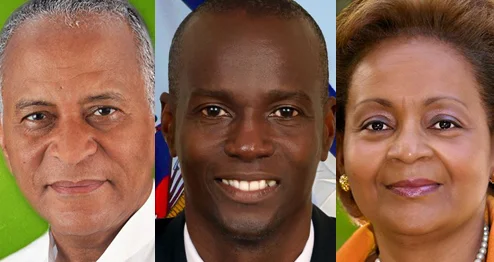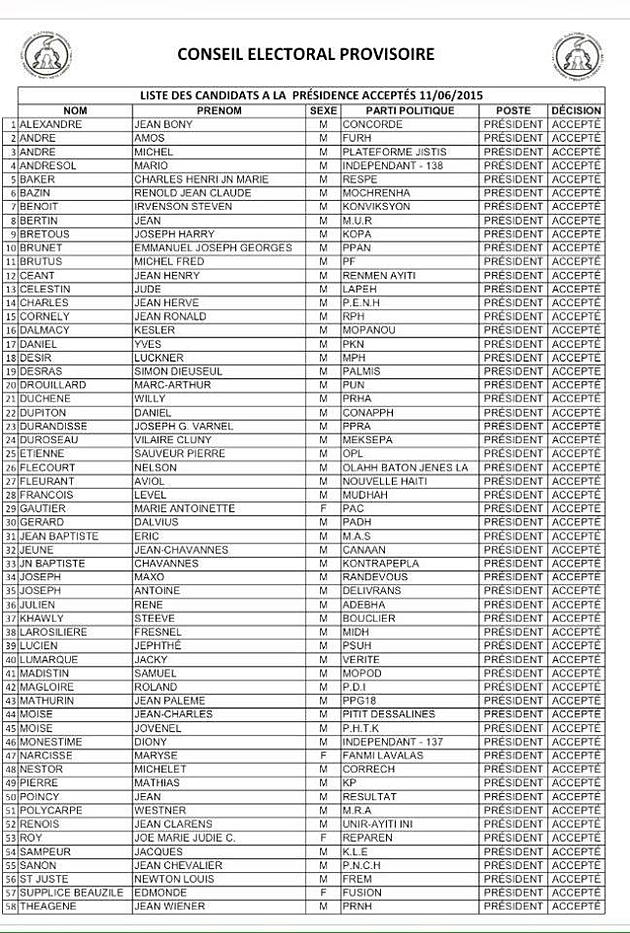A Haitian man registers for legal residency at the Interior Ministry in Santo Domingo, Dominican Republic, Tuesday, June 16, 2015. Army Gen. Rubel Paulino says those who havent registered by Thursday will be repatriated, which conflicts with statements by Interior Minister Ramon Fadul that there will be no mass deportations.
A Haitian man registers for legal residency at the Interior Ministry in Santo Domingo, Dominican Republic, Tuesday, June 16, 2015. Army Gen. Rubel Paulino says those who havent registered by Thursday will be repatriated, which conflicts with statements by Interior Minister Ramon Fadul that there will be no mass deportations.
Tatiana Fernandez AP
BY JACQUELINE CHARLES jcharles@MiamiHerald.com
Wilson Sentimo was hanging with friends in his northern Dominican rice town when the gun-toting soldiers jumped out of the back of the Daihatsu truck, and demanded to see his papers.
“I told them I was Dominican, but they insisted I was Haitian,” said Sentimo, 25, recalling the day in February when he was rounded up during the military raid, thrown into the truck, and driven to four military posts before being dumped along with 30 others on the northeastern Dajabón-Ouanaminthe border.
Through efforts led by his employer Yspaniola, which contacted local and international human rights groups, Sentimo eventually made it back home the next day. But four months after his first and only visit to Haiti, Sentimo, like countless others in the Dominican Republic, remains in limbo.
“I am not at ease at all,” said Sentimo, who has a Dominican birth certificate but has had difficulty getting a Dominican national identity card because he’s been unable to get a copy of his deceased mother’s Haitian birth certificate. “I still fear being deported.”
That fear heightened after Haitians and other non-citizens scrambled to beat a 7 p.m. Wednesday registration deadline to stay in the country.
As the clock ticked, confusion reigned about what will happen Thursday and in the coming days to the thousands who failed to “regularize” their status and those Dominicans of Haitian descent, like Sentimo, who because of their often dark complexion are deemed Haitian and vulnerable to deportation.
“The situation is terrible,” said Jonathan DiMaio, co-founder and executive director of Yspaniola, 20 minutes from the city of Santa Cruz de Mao where the line of Haitians at the government registration office snaked Wednesday into the barricaded streets.
“Aside from devastating families and lives, the human rights crisis distracts from long-term solutions to include Dominicans of Haitian descent in Dominican society,” DiMaio said.
Dominican authorities have been under enormous pressure from the Caribbean Community, the United States and others in the international community to avoid mass deportations of Haitians, while human rights organizations have called for an extension of Wednesday’s registration deadline.
“The information we have is that there will be no extension of the deadline,” Fabien Sambussy, camp coordination program manager with the International Organization for Migration, said from Port-au-Prince. “We don’t know if the Dominican Republic will unofficially keep registering the people or if they will start deporting the people. We don’t have any information on what they will do.”
U.S. State Department officials who flew to Santo Domingo earlier this year to meet with aid organizations and the foreign ministry are admittedly also confused about what the country will do, making it difficult for even them to assist Haiti and human rights groups with beefed-up contingency planning along the nations’ 233-mile porous border.
Still, Haiti announced this week that it had put plans in place to welcome repatriated nationals, installing four official crossing points around the country.
While calling on Haitians to unite to welcome back their “compatriots,” Haitian Prime Minister Evans Paul on Tuesday denounced what he said were contradictory statements from Santo Domingo. While Dominican Foreign Minister Andres Navarro, for instance, guaranteed there will be no mass deportations, Army Gen. Rubén Darío Paulino announced that the immigration department and military would launch neighborhood patrols Thursday in search of those without documents.
“Faced with the double language of the Dominican government, the Haitian government has made arrangements to welcome our compatriots and other people who are not necessarily of Haitians, but who face the decision of the judgment of the 168-13 Dominican Constitutional Court,” Paul said at a news conference.
The latest chapter in the long-running Haitian-Dominican saga comes nearly two years after the Dominican Republic’s Constitutional Court retroactively stripped citizenship from anyone born after 1929 who doesn’t have one parent of Dominican blood. In response to international criticism, the country soon introduced a path to citizenship, requiring most of the denationalized Dominicans to declare themselves as foreigners to obtain a residency permit in the hope of eventually getting Dominican citizenship. The deadline for that program lapsed on Feb. 1 with only a handful applying, leaving tens of thousands at risk of expulsion.
Now, five months later, comes a new deadline, this one for undocumented immigrants to adjust their status. While an estimated 250,000 — the majority of them Haitians — have started the registration process, the number is still far less than the estimated 500,000 foreign-born migrants who are deemed eligible for the regularization program, according to the Dominican Republic’s Interior Ministry.
“The implementation has been fraught with problems that affect real people who are already extremely vulnerable,” said Angelita Baeyens, program director, Partners for Human Rights Robert F. Kennedy Center for Justice and Human Rights. “Only a very small number have received any sort of document that proves they are under the regularization plan.”
On Wednesday, in Santa Cruz de Mao, hundreds of Haitians stood in long lines, hoping to turn in their documents. Late arrivals paid $125 in bribes to soldiers for a spot, while others complained they had spent the night in line. They blamed the last-minute rush on difficulties accessing their Haitian birth certificates to prove their identity, and other documents needed to show that they had been living in the country since Oct. 2011.
Lines were equally long in Santo Domingo, where Haiti’s ambassador to the Dominican Republic, Daniel Supplice, said staffers were working as fast as they could to process paperwork so migrants could register.
“There is a lot of pressure,” Supplice said. “We are doing the best that we can.”
While Supplice reiterated that the agreement between Haiti and the Dominican Republic says “the only people they will put at the border are Haitians who are here on an irregular migration situation,” he conceded that his impoverished nation was ill-equipped to prevent the deportation of Dominicans of Haitian descent along its border, which has more than 140 entry points.
He appealed to nongovernmental and human rights organizations to help screen persons along the border.
“Somebody comes to the border. He’s black, OK. He speaks a little, Creole, OK. He speaks a little Spanish and they say he’s Haitian. But the man says he’s ‘Dominican, I was born in the Dominican Republic.’ How are we going to know that when he doesn’t have any papers to prove that?” Supplice said. “We believe there are a bunch of other factors that someone who knows the Dominican Republic well, can help us decipher.”
Still fear persist on both sides of the border.
“They are coming with their mattresses, beds, suitcases,” said Sen. Jean Baptiste Bien Aimé, who represents northeastern Haiti. “You know every time there is a deportation in the Dominican Republic, the situation turns desperate. People don’t want to get beaten, so they leave.”
Those who haven’t left voluntarily, have been expelled during military raids despite a moratorium on deportations, said Edwin Paraison, a former minister of Haitians living abroad who has long been at the forefront of the Haitian migrant issue in the Dominican Republic.
“Everyday it is happening and no one has protested,” he said. “The Dominican military doesn’t respect the norms or the laws of the Dominican Republic.”
Paraison said the Haitian and Dominican governments have to step up diplomatic efforts to avert a major crisis, especially in an election year in Haiti. He has called on both to set up centers in Haiti to process Dominicans of Haitian descent who do get deported so they can quickly be returned to the Dominican Republic.
Others in Haiti, such as Jean-Robert Argant, are calling on the international community to take a tougher stance with the Dominican Republic and its deportation policy, and for Haitians themselves to protest the decision by reducing trade with the Dominican Republic.
“We don’t have an army, but we have an army of mouths,” Argant said, referring to Haiti’s dependency on food imports from its neighbor. “What’s being done is a violation of human rights and certainly very racist.”
Special Correspondents Gérard Maxineau contributed to this report from Cap-Haitien, Haiti and Alba Reyes from Santa Cruz de Mao, Dominican Republic.
Read more here: http://www.miamiherald.com/news/nation-world/world/americas/haiti/article24820618.html#storylink=cp











